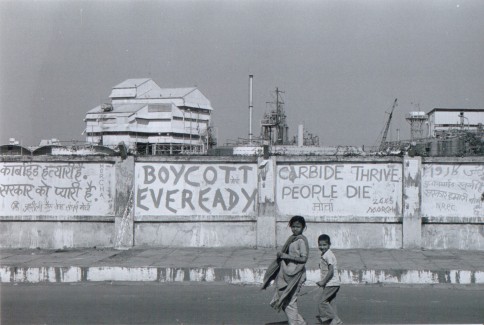 Martin Stott was in Bhopal during January and February of 1986. He took a lot of interesting photos which, for the most part, had never been printed until he offered them to us at the Bhopal Medical Appeal. A selection of the pictures can be found on our Flickr page and, below here, are Martin’s own words describing the trip. BMA Flickr Page
Martin Stott was in Bhopal during January and February of 1986. He took a lot of interesting photos which, for the most part, had never been printed until he offered them to us at the Bhopal Medical Appeal. A selection of the pictures can be found on our Flickr page and, below here, are Martin’s own words describing the trip. BMA Flickr Page
‘I was commissioned by the Bhopal Victims Support Committee (BVSC) to go to Bhopal in early 1986 to support the former workers at the Union Carbide plant and gas victims in the locality because BVSC as well as campaigning for proper compensation for the victims and medical relief for those suffering the after effects was keen to address the longer term implications of the closure of the plant.
A request from the Gas Peedhit Rahat Samiti ( G.P.R.S. U.S. Teegal Gen Sec) (who described themselves as ‘a coalition of former workers and gas victims’ and were formed in July 1985) was received seeking support for someone with experience of popular planning and co-operative development initiatives in the UK to support them in ‘developing a alternative production/employment strategy for the people who have suffered in the tragedy’. The proposal was to focus on developing an alternative production idea, particularly in terms of structures ie ways of creating a co-operative or series of worker/community controlled initiatives which were responsive to local needs. BVSC supported an application to Quaker Peace & Service’s ‘1% Fund’ for financial support to enable me to pay for travel subsistence and accommodation while on the assignment. it was successful and i was in Bhopal in January and February 1986.
i worked with GPRS and met with other campaigning groups including S.E.W.A (with whose Secretary Ramchanda Bharga i stayed while there) and was part of a delegation to the Union Carbide offices in Bhopal and also travelled to other parts of western India visiting groups e.g. trades unions in Mumbai, who were supporting the workers at Union Carbide, and learning about other socially useful production initiatives in India to inform the thinking in Bhopal.
Contact continued after my return including sending relevant materials out to GPRS, speaking at conferences in the UK(including with representatives of SEWA visiting the UK) and writing about the initiative e.g. in the New Statesman (July 1986).’


